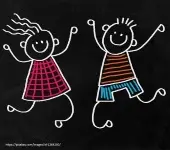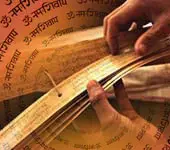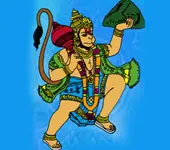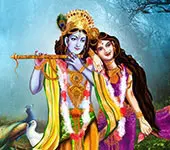This audio tells you about - 1. Why Sage Vyasa wrote Srimad Bhagavata 2. How Bhagavata is an avatara of Bhagavan in book form.
Who is the son of Veda Vyasa?
Shukadeva.
Who is Badarayana?
Veda Vysasa is known as Badarayana.
Why was Bhagavata written?
1. Sage Vyasa wanted to propagate bhakti and the greatness of Lord Krishna. 2. He was sure that through the path of bhakti, people can attain their spiritual goals and also lead a virtuous life. 3. Vyasa wanted a simple method to achieve these and Bhagavata was the result of this quest.
How long is Srimad Bhagavatam?
There are 335 chapters spread across 12 Skandhas (Cantos) in Bhagavata. The total number of verses is 18,000.
Quiz
Who is the daughter of Lord Krishna and Rukmini ?Transcript
(Click here to read more)
We are almost into the 25th part of our series on Bhagavata and we haven't even got into Bhagavata. Why so much of preface and prelude? Because in today's world unless you tell what is in there, how it is going to benefit you, nobody takes interest in anything. How is it personally going to benefit me is everybody's lookout. You will have to spend hundreds of hours listening to the story of Sri Hari. But at the end, is there any tangible benefit? Will your life improve? How will it ....
Transcript
(Click here)
We are almost into the 25th part of our series on Bhagavata and we haven't even got into Bhagavata.
Why so much of preface and prelude?
Because in today's world unless you tell what is in there, how it is going to benefit you, nobody takes interest in anything.
How is it personally going to benefit me is everybody's lookout.
You will have to spend hundreds of hours listening to the story of Sri Hari.
But at the end, is there any tangible benefit?
Will your life improve?
How will it improve the way you look at the world, how will it change the way you look at life itself?
This has to be told.
In no uncertain terms.
Unless this is told, interest will not come.
This is part of our system.
Phalashruti is part of every stotra.
Sankalpa is done before every ritual, this is why I am doing this.
We as a culture, are very organized, very systematic.
Result is important for us.
We won’t easily fall for false promises.
Whatever Sage Vyasa and others have said are 100% truth.
If you follow what they say with faith, systematically, it is 100% bound to happen.
There is no marketing effort in any of their works.
They were not trying to add numbers.
It never made sense in those days.
There was no propagation only.
Whatever they said, taught us was for the development of the individual and through that development of the community.
Adding numbers was not even there in their mind.
There was no royalty consideration, that more copies of my book should sell, it should become a bestseller.
I should make money out of it.
These concepts themselves were not there when they wrote these books and gave us this knowledge.
There is absolutely no reason not to trust even a single word among what all they have written.
The purpose is to call our attention, make us interested, for our own sake.
Who should listen to Bhagavata?
Anybody with interest or without interest can listen.
Even if you don’t have interest, you will develop interest as you go on listening.
There are some rules of course for the person who is telling the stories.
Don't force it upon somebody.
Understand the intention of the listener.
We have examples from the past wherein some people learned Sanskrit and rewrote even the Puranas to suit their agenda.
Let this not happen.
Any genuine person can listen.
Tell the story as the listener would understand.
If it is beyond the grasping level of the listener, he will soon lose interest.
Either way, both high and low, but in a public discourse, it can not be tailor-made to suit the audience.
Always, the effort is to strike a balance.
Suta was blessed with a good audience, all intelligent Rishis and Munis.
Eager to listen.
Focused.
And the holy atmosphere of Naimisha.
And the story is also such, if you start listening to it, you won’t feel like listening to anything else.
Why did Vyasa write Bhagavata?
We saw that Bhagavata is meant for Kaliyuga.
Even today, among us, we see people who have a kind heart.
They work among those who are suffering, trying for their upliftment.
Those who work among lepers, tribals, terminally ill, in war-affected areas, risking their own lives.
Those who work among patients in epidemic and pandemic affected areas.
How are they able to do this?
Because God has made them that way, full of kindness and mercy.
They won’t be able to ignore suffering of others.
They don’t do this to get name fame or money.
They won’t be able to stop themselves from getting involved, helping others.
In the same way, when Vyasa Maharshi saw the suffering in the world, he couldn’t stop himself from coming with a solution.
Of course, he is avatara of Sri Hari Paramatma, who is an ocean of kindness.
Sage Vyasa realized that most of the suffering was because of the over-attachment of the people with the senses, with their own body.
They can’t think beyond their body, their happiness, their problems, their profit, their loss.
This attachment merely to the experiences that the bodily organs can give is a characteristic of animals.
Man is endowed with viveka, intelligence, all these faculties, not to live like animals.
Like dogs people are living - give him something to eat, he will wag his tail.
Inflict some pain, he will cry at the top of his voice.
This is what many people also do.
Then the Almighty would think- what is the point in giving a human birth to such people?
In the next birth, the Almighty will send them to other yonis, to be born as dogs, donkeys, swine, rather than wasting another human birth.
How to make people understand this in a simple way?
How to make them live their life with a purpose?
That is when the Sage wrote Srimad Bhagavata.
There is another interesting aspect to this.
When Lord Krishna was about to return to his own abode after completing his avataroddesha like elimination of Kamsa, the battle of Kurukshetra; truth, honesty, purity, charity, dharma, they also wanted to go with him.
The world would be doomed if that happens.
The Lord made Sage Vyasa to produce them in the form of a book so that they all can spread and still remain in the world.
This is Bhagavata.
In fact, another avatara of the Lord in book form.
Earlier, we had seen this.
We compared other Shastras to sugarcane and Bhagavata to sugar.
This is not in any way to belittle other shastras.
In fact, not a single word in any of the authentic shastras is a waste.
Everything has a use.
After the juice is extracted, what remains of the sugarcane is fed to the cows.
After drying it, it can be used as fuel for cooking.
Not just sugar, jaggery also comes out of sugarcane.
But for us, it is easiest if it is sugar.
Adding it to tea, coffee, sweets.
If it is sugar, that is the easiest.
The sweetness that a spoonful of sugar can give, to get the same sweetness, you may have to add jaggery in a much bigger quantity or a glassful of sugar cane juice.
Sugar is compact, very simple to use, the effect can be easily measured, the sweetness can be easily measured.
This is the difference between Bhagavata and other shastras.
Suta had already told Sage Shaunaka and the other Rishis at Naimisharanya that Bhagavata did not come to him from Sage Vyasa.
After he wrote Bhagavata, Sage Vyasa taught it to his own son Shukadeva.
Raja Parikshit was suffering from the curse upon him, he was sitting sad, not knowing what to do on the banks of Gangaji.
That’s when Shukadeva made him listen to the entire Bhagavata, in seven days.
Not just Parikshit, many Rishis, and Munis were also present there.
Suta was also present there.
That’s where Suta heard Bhagavata, which he will be retelling now at Naimisharanya.
Recommended for you
Chandamama - March - 1979
 Click here to know more..
Click here to know more..
Importance of Annadaana explained in Veda-Part 3
 Click here to know more..
Click here to know more..
Vayuputra Stotram

udyanmaartaand'akot'i- prakat'aruchikaram chaaruveeraasanastham maunjeeyajnyopaveetaabharana- murushikhaashobhitam kund'alaangam. bhaktaanaamisht'adam....
Click here to know more..
English Topics
Bhagavatam
Click on any topic to open
- 65 Bhagavan's External Deeds
- 64 Is the Body Yours?
- 63 What's So Great About The Stories Of Sri Krishna
- 62 What To Do If You Just Don't Have Interest In Bhagawan
- 61 Which God Should I Worship?
- 60 How To Observe Dharma Properly
- 59 Devotee's progress
- 58 Which Guruji Can You Trust
- 57 Bhagawan Is Beyond Human Comprehension
- 56 The Missing Piece: Why Your Spiritual Practices Are Not Working
Please wait while the audio list loads..
30
Ganapathy
Shiva
Hanuman
Devi
Vishnu Sahasranama
Mahabharatam
Practical Wisdom
Yoga Vasishta
Vedas
Rituals
Rare Topics
Devi Mahatmyam
Glory of Venkatesha
Shani Mahatmya
Story of Sri Yantra
Rudram Explained
Atharva Sheersha
Sri Suktam
Kathopanishad
Ramayana
Mystique
Mantra Shastra
Bharat Matha
Bhagavatam
Astrology
Temples
Spiritual books
Purana Stories
Festivals
Sages and Saints
